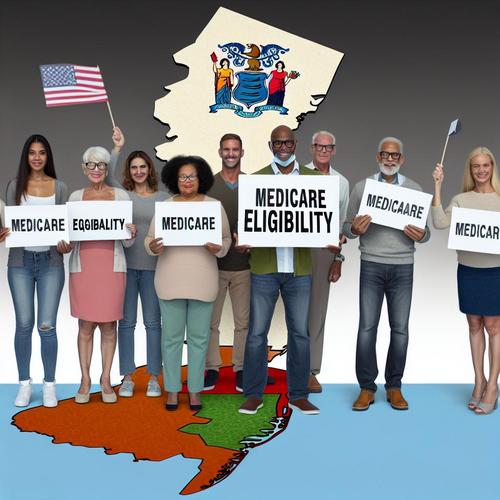Medicare Eligibility in New Jersey
Are you a resident of New Jersey wondering if you qualify for Medicare? Understanding the eligibility criteria for this essential healthcare program is crucial for your well-being. Let’s delve into what it takes to qualify for Medicare in the Garden State.
First and foremost, it’s essential to know that Medicare eligibility in New Jersey, as in the rest of the United States, is primarily based on age and disability status. Individuals aged 65 and older are typically eligible for Medicare, while those under 65 may qualify if they have certain disabilities or medical conditions.
For most people, Medicare eligibility begins at age 65, regardless of whether they are still working or have retired. If you are already receiving Social Security benefits, you will be automatically enrolled in Medicare Parts A and B when you turn 65. However, if you are not yet receiving Social Security benefits, you will need to sign up for Medicare during your Initial Enrollment Period.
Medicare eligibility for individuals under 65 is based on receiving Social Security Disability Insurance (SSDI) benefits for a certain period or having certain disabilities, such as end-stage renal disease or amyotrophic lateral sclerosis (ALS).
It’s important to note that Medicare eligibility criteria may vary based on your specific circumstances, so it’s advisable to seek expert guidance to navigate the complexities of the healthcare system. Consulting with a Medicare advisor can help you understand your eligibility status and choose the right Medicare plan for your needs.
Stay tuned to learn more about the benefits of seeking expert guidance in navigating the Medicare system and understanding the criteria for eligibility in New Jersey. Remember, taking the time to educate yourself about Medicare eligibility can have a significant impact on your access to quality healthcare services.
Benefits of Seeking Expert Guidance
Deciding on your Medicare plan can be overwhelming with so many options available. This is where seeking expert guidance can make a world of difference. Medicare advisors are trained professionals who understand the complexities of Medicare eligibility and can provide you with personalized assistance in selecting the right plan for your needs.
One of the key benefits of seeking expert guidance is that you will have access to up-to-date information on the latest Medicare plans and changes in regulations. This can save you time and effort in researching on your own, ensuring that you are making an informed decision based on the most current information available.
Medicare advisors can also help you navigate the eligibility criteria and requirements, ensuring that you meet all the necessary qualifications to enroll in Medicare. They can answer any questions you may have and provide you with clear explanations of the different plan options, helping you make a well-informed decision that fits your healthcare needs and budget.
Furthermore, Medicare advisors can help you compare different plans and their coverage options, ensuring that you choose a plan that aligns with your specific medical needs and preferences. This personalized guidance can help you avoid costly mistakes and ensure that you are getting the most out of your Medicare coverage.
By seeking expert guidance, you can feel confident that you are making the best decision for your healthcare needs. Medicare advisors are there to support you every step of the way, from understanding eligibility criteria to choosing the right plan and enrolling in Medicare.
Don’t let the complexities of Medicare overwhelm you – seek expert guidance and make the process as smooth and stress-free as possible. Your health and well-being are too important to leave to chance, so take advantage of the expertise and support that Medicare advisors can provide.
Find Medicare Plans in 3 Easy Steps
We can help get up to $0 monthly premium Medicare plans
Understanding Medicare Eligibility Criteria
Medicare is a federal health insurance program that provides coverage for individuals who are 65 years old or older, as well as for certain younger individuals with disabilities and those with end-stage renal disease. Understanding the eligibility criteria for Medicare is crucial in ensuring that you or your loved ones receive the healthcare coverage they need.
Key Eligibility Factors:
- Age: The most common way to qualify for Medicare is by turning 65 years old. If you are already receiving Social Security benefits, you will be automatically enrolled in Medicare Parts A and B when you turn 65. However, if you are not receiving Social Security benefits, you will need to sign up for Medicare during the Initial Enrollment Period.
- Disability: Individuals under 65 may also qualify for Medicare if they have been receiving Social Security Disability Insurance (SSDI) benefits for at least two years. In this case, Medicare eligibility will depend on the individual’s disability status and the length of time they have been receiving SSDI benefits.
- End-Stage Renal Disease (ESRD): Individuals of any age with ESRD, also known as kidney failure, are eligible for Medicare if they require regular dialysis or a kidney transplant. In this case, eligibility for Medicare will begin on the first day of dialysis treatment or the month of a kidney transplant.
It’s important to note that Medicare eligibility and enrollment can be complex, with different rules and timelines depending on your individual circumstances. Seeking guidance from a Medicare advisor can help you navigate the eligibility criteria and ensure that you enroll in the right Medicare plan for your needs.
Additionally, understanding the various parts of Medicare – Parts A, B, C, and D – and their coverage options is essential in making informed decisions about your healthcare coverage. Each part of Medicare provides different benefits, so it’s important to choose a plan that aligns with your healthcare needs and budget.
By familiarizing yourself with the eligibility criteria for Medicare and seeking expert guidance, you can make informed decisions about your healthcare coverage and ensure that you receive the care you need as you age or if you have a disability. Remember, it’s never too early to start planning for your healthcare needs and exploring your Medicare options!
Choosing the right Medicare plan is a crucial decision that can greatly impact your healthcare coverage and overall well-being. With so many options available, it’s important to carefully consider your individual needs and circumstances before making a choice. Here are some key factors to keep in mind when selecting a Medicare plan:
- Coverage Needs: Consider your current health status, any chronic conditions you may have, and the medications you are taking. Make sure the plan you choose covers the services and treatments you need.
- Cost: Compare premiums, deductibles, copayments, and coinsurance for different plans. Keep in mind that the lowest premium plan may not always be the most cost-effective option in the long run.
- Provider Network: Make sure your preferred doctors, specialists, and hospitals are included in the plan’s network. If you have a specific healthcare provider you want to continue seeing, check if they accept the plan you are considering.
- Prescription Drug Coverage: If you take prescription medications, make sure the plan includes coverage for them. Look into the plan’s formulary to see if your medications are covered and at what cost.
- Additional Benefits: Some Medicare plans offer extra benefits like dental, vision, hearing, and fitness programs. If these benefits are important to you, look for a plan that includes them.
- Medicare Star Ratings: Check the Medicare Star Ratings for each plan to see how they compare in terms of quality and customer satisfaction. Higher-rated plans may offer better overall value and service.
- Enrollment Periods: Be aware of the different enrollment periods for Medicare, such as the Initial Enrollment Period, Annual Enrollment Period, and Special Enrollment Periods. Missing these deadlines can result in penalties or delayed coverage.
- Medicare Advantage vs. Original Medicare: Decide whether you want to enroll in Original Medicare (Parts A and B) with or without a supplemental Medigap plan, or a Medicare Advantage plan (Part C) that combines Parts A, B, and often Part D (prescription drug coverage).
By carefully considering these factors and doing your research, you can make an informed decision when selecting a Medicare plan that best meets your needs and budget. Remember, it’s always a good idea to seek guidance from a Medicare advisor or healthcare professional who can help you navigate the complexities of the Medicare system and find the right plan for you. Don’t hesitate to ask questions, compare options, and take your time in making this important decision about your healthcare coverage. Your health and peace of mind are worth the effort!
Find Medicare Plans in 3 Easy Steps
We can help get up to $0 monthly premium Medicare plans
Heading V: How Medicare Advisors Can Help
Are you feeling overwhelmed by the complexities of Medicare eligibility and the various plan options available? Don’t worry, you’re not alone. Many seniors in New Jersey struggle to navigate the world of Medicare on their own, which is why seeking expert guidance from Medicare advisors can make a world of difference.
Medicare advisors are trained professionals who specialize in helping individuals understand their Medicare options and choose the right plan that fits their unique needs and budget. They can provide personalized assistance to ensure you make informed decisions about your healthcare coverage.
Here are some ways in which Medicare advisors can help:
- Expertise: Medicare advisors have a deep understanding of the complex rules and regulations surrounding Medicare. They can help you navigate the system and make sense of all the jargon.
- Personalized Recommendations: Medicare advisors will take the time to understand your healthcare needs and financial situation to recommend a plan that best suits your requirements.
- Cost Savings: Medicare advisors can help you find cost-effective plans that provide comprehensive coverage without breaking the bank. They can also help you identify potential savings opportunities.
- Enrollment Assistance: Medicare advisors can assist you with the enrollment process, ensuring that you meet all deadlines and requirements.
- Post-Enrollment Support: Medicare advisors can continue to provide support even after you’ve enrolled in a plan. They can help you navigate any issues or changes that may arise.
Overall, working with a Medicare advisor can give you peace of mind knowing that you have expert guidance every step of the way. They can help simplify the process, answer your questions, and ensure that you are making the best decisions for your healthcare needs.
So, if you’re feeling overwhelmed or confused about Medicare eligibility and plan options, don’t hesitate to reach out to a Medicare advisor. Their expertise and guidance can make a world of difference in helping you navigate the world of Medicare with confidence.
Factors to Consider When Choosing a Medicare Plan
When it comes to choosing a Medicare plan, there are several factors to consider to ensure you are getting the coverage that best meets your needs. With so many options available, it can be overwhelming to navigate the complex world of Medicare on your own. Here are some key factors to keep in mind when selecting a Medicare plan:
- Cost: Consider the monthly premiums, deductibles, co-pays, and coinsurance associated with each plan. Make sure to choose a plan that fits within your budget.
- Coverage: Look at the specific benefits offered by each plan, including coverage for prescription drugs, doctor visits, hospital stays, and other medical services you may need.
- Network: Check to see if your preferred doctors, hospitals, and healthcare providers are in the plan’s network. Out-of-network costs can add up quickly.
- Prescription Drugs: If you take medications regularly, make sure the plan includes coverage for your specific prescription drugs at an affordable cost.
- Supplemental Coverage: Consider adding supplemental coverage, such as Medigap or Medicare Advantage plans, to fill in the gaps left by Original Medicare.
- Quality of Care: Research the quality ratings of different Medicare plans to ensure you are receiving high-quality care from reputable providers.
- Convenience: Choose a plan that offers convenient access to healthcare services, such as telehealth options or online prescription refills.
- Customer Service: Look for a plan with good customer service and support to help you navigate any issues that may arise with your coverage.
By carefully considering these factors and working with a knowledgeable Medicare advisor, you can make an informed decision about which Medicare plan is right for you. Remember, your healthcare needs may change over time, so it’s important to review your coverage annually and make adjustments as needed to ensure you are always getting the best care possible.
Find Medicare Plans in 3 Easy Steps
We can help get up to $0 monthly premium Medicare plans
Conclusion and Next Steps
Congratulations on taking the first step towards understanding Medicare eligibility and finding the right plan for your needs in New Jersey! By learning about the criteria, benefits, and importance of seeking expert guidance, you are well on your way to making informed decisions about your healthcare coverage.
As you navigate through the maze of Medicare options, remember that you don’t have to do it alone. Seeking help from Medicare advisors can provide you with valuable insights and personalized recommendations that can save you time, money, and stress in the long run.
Now that you have a better understanding of how Medicare eligibility works and the benefits of choosing the right plan, it’s time to take action. Here are a few next steps to consider:
- Evaluate Your Healthcare Needs: Take some time to assess your current and future healthcare needs. Consider factors such as prescription drug coverage, doctor preferences, and budget constraints.
- Research Medicare Plans: Explore the different Medicare plans available in New Jersey, including Original Medicare, Medicare Advantage, and Medicare Supplement plans. Compare their benefits, costs, and coverage options to find the best fit for you.
- Consult Medicare Advisors: Reach out to Medicare advisors or insurance agents who specialize in Medicare. They can provide you with personalized guidance, answer your questions, and help you navigate the enrollment process with ease.
- Enroll in a Plan: Once you’ve done your research and received expert advice, it’s time to enroll in a Medicare plan that meets your needs. Make sure to review your options carefully and submit your enrollment application on time.
- Review and Adjust Annually: Remember that your healthcare needs may change over time. It’s important to review your Medicare coverage annually during the open enrollment period and make adjustments as needed to ensure you have the best coverage for your current situation.
By following these steps and staying informed about your Medicare options, you can make confident decisions about your healthcare coverage and enjoy peace of mind knowing that you have the right plan in place. Remember, you’re not alone on this journey – there are resources and experts available to help you every step of the way.
So, take charge of your healthcare journey, explore your Medicare options, and make informed decisions that will benefit you now and in the future. Your health and well-being are worth the effort!
If you have any questions or need assistance with navigating the Medicare system in New Jersey, don’t hesitate to reach out to Medicare advisors or insurance professionals who can provide you with the guidance you need. Here’s to your health and happiness!






